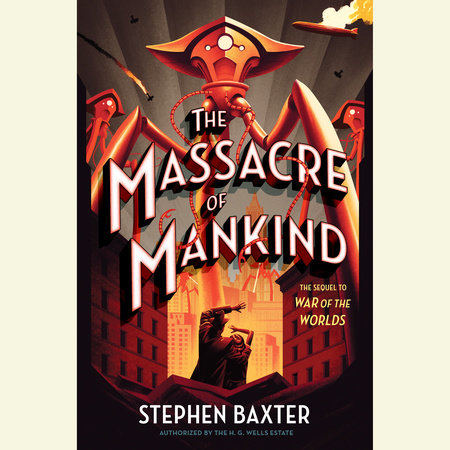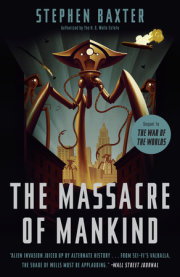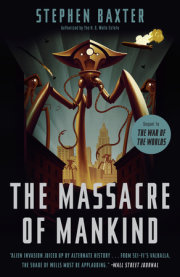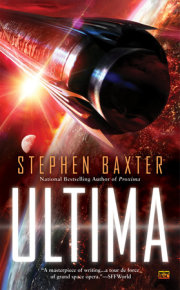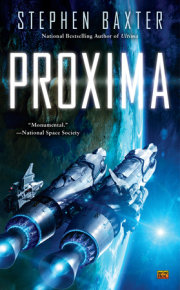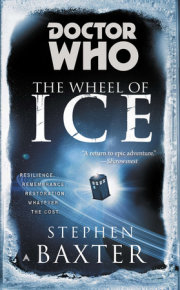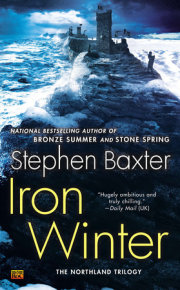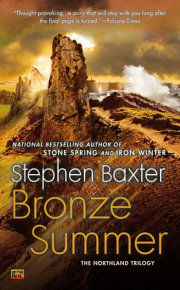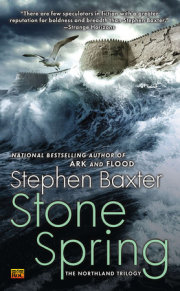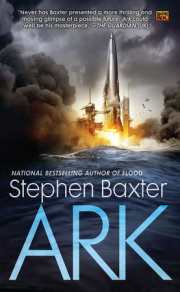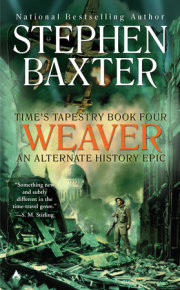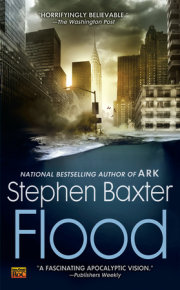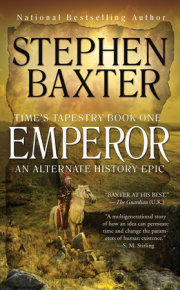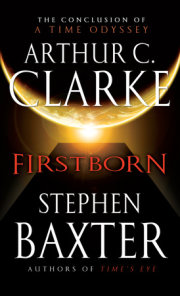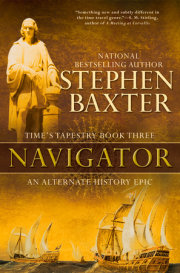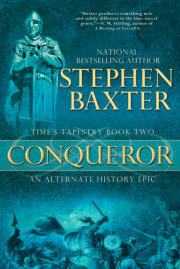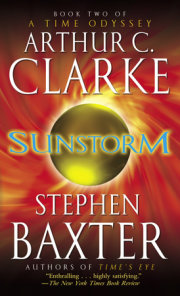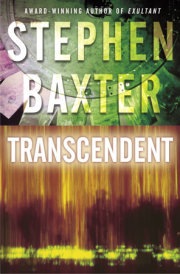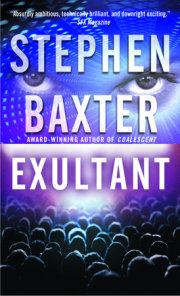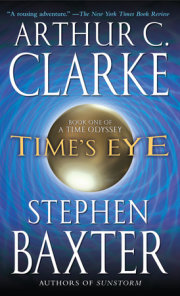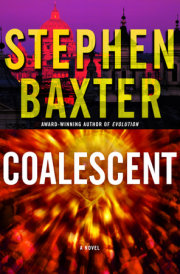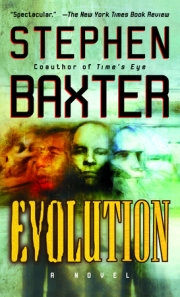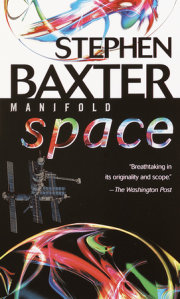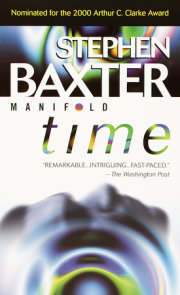Copyright © 2017 Stephen Baxter.
***This excerpt is from an advance uncorrected proof***
Chapter 1 – A CALL TO ARMS
To those of us who survived it, the First Martian War of the early twentieth century was a cataclysm. And yet, to minds far greater than our own and older even than the Martians, minds who regard our world from the cold outer reaches of space, that conflict must have seemed a trivial affair indeed, and unworthy.
The further a world is from the sun, the older it must be, and cooler. Thus the earth is older than hot, fecund Venus; and Mars, austere and chill, is in turn older than our temperate globe. The outer worlds, Saturn, Uranus and Neptune, are ancient indeed and locked in the stasis of time and ice. But Jupiter—king of planets, more massive than the rest combined, older than Mars as Mars is older than our world, and warmed by its own inner fire—is, must be, host to the gravest intellects of all. We know now that these Jovian minds have long watched us—watched humanity, the Martians, even innocent Venus. What can they have thought of our War? The fragile sparks crossing the night, the flares of fire on the green skin of our planet, the splash of ink-black smoke—the swarming and helpless populations . . . The Jovians looked on all this as a silent god might regard his flawed creations, perhaps, their reflections unimaginable, their disapproval profound.
And yet, claims Walter Jenkins, that great chronicler of the First War, this cosmic scrutiny provides the context within which we, who once believed we were lords of creation, must live out our petty lives. Walter was right. This mighty context was to shape everything about the Second War, and indeed the most important moment of my own life.
On the other hand, I myself, like most people, stay sane by generally not thinking about it.
And speaking of grave scrutiny, as I commence this memoir of my own, I cannot help but acknowledge the long shadow cast by that tombstone of a volume which everyone knows as the Narrative, the history of the First War penned by Walter, my esteemed brother-in-law—if he can still be termed such after I divorced Frank, his brother—a work that, as Walter’s therapist Freud might say, has burned a particular perception of the First Martian War into the public subconscious with the intensity of a Heat-Ray. Let me warn the reader from the off that if it’s the grandeur of the cosmos that you want, all told in the lofty prose of a man who was once paid to scribble such stuff, then it’s another correspondent you should seek out. On the other hand if it’s an honest, factual account of my own experience you’re after—a woman who survived the First Martian War and had her life pulled to pieces in the Second—then I humbly submit this, history as I saw it.
Although I admit it is an irony that my experience of the second conflict should begin, long before a Martian again set foot on this earth, with a complicated series of telephone calls from Walter himself, emanating from a hospital in Vienna. I, who was patiently building a fresh life for myself in the New World, wanted nothing to do with it. But I have always had a sense of duty. I answered the summons.
A dotty-house, to Jupiter! From the beginning it was a tangled tale indeed.
Chapter 2 – A MEETING OF VERTERANS
My first inkling of the impending storm came in fact in New York, specifically at the Woolworth Building, where Major Eric Eden (retired) asked to meet me, in order, he said, to relay a message from Walter Jenkins.
My young colleague Harry Kane insisted on accompanying me. Harry was of that breed of brash American journalists who are always suspicious of all things European—he would have been even before the Schlieffen War, I think. I suppose Harry came as a kind of moral support, but with a professional curiosity too about a Martian War that to him had been only a distant spectacle of his youth.
So we made our way. It was a brisk mid-March day in the year 1920. Manhattan had suffered what everybody hoped would prove to be the last snowstorm of the year, although the main hazard on that particular morning turned out to be the slush piles alongside every sidewalk, ever ready to soak an unwary ankle. I remember that morning: the swarming, cheerfully ill-tempered traffic, the electric advertising hoardings that glowed in the grayness of the day—the sheer innocent vigor of a young nation—in those last hours and minutes before I was dragged back into the affairs of gloomy, wounded old England.
At last Harry and I pushed through the doors into the Woolworth. The air in the lobby, heated and scented, hit me like a slap in the face. In those days the Americans liked to be very warm indoors. I pulled open my coat and loosened my headscarf, and we walked across a floor of polished Greek marble that was speckled with melted snow and grit from the street. The lobby was busy. Harry, with his usual air of amused detachment—an attractive trait in a man a few years younger than me, even if it doesn’t sound it—said to me over the noise, “I take it your Major Eden doesn’t know the city so well.”
“You can say that without ever meeting him?”
“Sure I can. Where else would you set up a meeting but here? In London an American would meet you at St. Paul’s—that’s the one with the hole in the dome, right? And a British in New York—well, here we are, in the tallest building in the world!” He pointed. “And there he is, by the way.” The man he indicated stood alone. He was slim, not tall, and wore a morning suit that looked expensive enough but dowdy compared to the peacock fashions around him. If this was Eden he looked younger than his thirty-eight years—six years older than me. “And that must be Eden because—”
“He’s the only one looking at the artwork.”
Indeed, the man was staring up at the ceiling, which (had I ever noticed this before?) was coated with mosaics that looked Roman, perhaps Byzantine. That was the Americans for you: in this new monument to a triumphant Mammon, they felt the need to reach back to their detached European past.
Harry strode across the floor, muttering, “And could he look more the Englishman abroad? If this is the best he can do to blend into the back- ground, no wonder the Martians caught him.”
That made me snort with laughter as I followed. “Hush. You’re terrible. The man’s a hero.” Eric Eden was, after all, the only living human being who had actually been inside a functioning Martian cylinder—he was captured in the first couple of days in ’07, as the military, in their ignorance, probed at the first landing pit at Woking. Having been kept alive, perhaps as a specimen for later examination, Eric had fought his way out of a space cylinder with nothing much more than his bare hands, and had ultimately made it back to his unit with invaluable information on Martian technology.
Hero or not, Eric looked rather nervous as we bore down on him. “Mrs. Jenkins, I take it—”
“I prefer Miss Elphinstone, actually, since my divorce.”
“My apologies. I imagine you recognized me from the posters in the bookshop windows.”
Harry grinned. “Something like that.”
“It has been a well-announced tour. Just Bert Cook and myself for now, but we should be joining up with old Schiaparelli in Boston—discoverer of the canals, you know—in his eighties but going strong . . .”
I introduced Harry quickly. “We both work for the Post.”
“I’ve not read your book, sir,” Harry admitted. “It’s kind of out of my sphere. I spend my time fighting Tammany Hall as opposed to men from Mars.”
Eric looked baffled, and I felt moved to interpret. “Tammany Hall’s the big Democrat political machine in the city. Americans do everything on a heroic scale, including corruption. And they were not men in that cylinder, Harry.”
“However,” Harry went on, unabashed, “I’ve been known to dabble in the book trade myself. Sensational potboilers, that’s my line, not having a heroic past to peddle.”
“Be glad of that,” Eric said, softly enough. A line which seemed to me the embodiment of British understatement! “Miss Elphinstone, Walter Jenkins did warn me of your likely—ah, reluctance to become entangled in his affairs once more. Nevertheless Mr. Jenkins did press on me the importance of his message, for you, the rest of his family. He seems to have fallen out of touch with you all. Indeed that’s why he had to make such a circuitous attempt to contact you, through myself.”
“Really?” Harry grinned. “Isn’t this all kind of flaky?” He twirled a finger beside his temple. “So the man needs to talk to his ex-wife, and the only way he can do it is by contacting somebody he barely knows, with respect, sir, on the other side of the world, in the hope that he can talk to his brother’s ex-wife—”
“That’s Walter for you,” I said, feeling oddly motivated to defend the man. “He never was very good at coping.”
Eric said grimly, “And that was presumably even before he spent weeks being chased by Martians across the countryside.”
Harry, young, confident, was not unsympathetic, but I could see he did not understand. “I don’t see what favors Jenkins has done you either, Major Eden. I saw the interview you gave to the Post, where you attacked him for claiming to have seen more of the Martians than any other eyewitness, when they were at loose in England. As you said, you certainly saw stuff he never did.”
Eric held up his hand politely. “Actually I didn’t say that, not quite. Your reporter rather gingered it in the telling—well, you have to sell newspapers, I suppose. But I rather feel that we veterans should, ah, stick together. And besides, if you take a longer view, Jenkins did me a favor. One cannot deny that his memoir is the one that has most shaped public perception of the War ever since its publication. And he does mention me, you know.”
“He does?”
“Oh, yes. Book I, Chapter 8. Although he does describe me mistakenly as ‘reported to be missing.’ Only briefly!”
I snorted. “The man’s in the dictionary under ‘Unreliable Narrator.’ ” “But he never related my own adventures, as he did Bert Cook’s, say,
and so I got the chance to tell it myself—and my publishers to label it as an ‘untold story.’ ”
Harry laughed. “So it’s all business in the end? Now that I do sympathize with. So what’s the plan, Major Eden? We gonna stand around gawping at frescoes all day?”
“Mosaics, actually. Sorry. Miss Elphinstone, Mr. Jenkins wishes to make a telephone call. To you, I mean.”
Harry whistled. “From Vienna? Transatlantic? That will cost a pretty penny. I know we’re all excited by the new submarine cable and all, but still . . .”
Eric smiled. “As I understand it Mr. Jenkins is not short of pennies, thanks to the success of his book. Not to mention the rights he has sold for the movie versions.” He glanced at his watch. “Anyhow, Jenkins will make the call to our hotel suite—I mean, mine and Bert’s. If you wouldn’t mind accompanying me there—”
“Which hotel?”
Eric looked faintly embarrassed. “The Plaza.” Harry laughed out loud.
“I myself would have been content with more modest accommodation, but Bert Cook—”
I said, “No need to apologize. But—” I looked Eric in the eyes, and I recognized something of myself in there—something I could never share with Harry, good-hearted though he was. The look of the war veteran. “Why would he call? Could it be they are coming back? And why now? The timing’s all wrong, isn’t it?”
Eric only shrugged, but he knew what I meant.
I was never an astronomer, but since the Martian War we had all picked up a little about the dance of the planets. Mars and the earth chase each other around the sun like racing cars at Brooklands. The earth, on the in- side track, moves faster, and periodically overtakes Mars. And it is at these moments of overtaking, called oppositions (because at such instances sun and Mars are at opposite poles as seen in the earth’s sky), that Mars and the earth come closest to each other. But Mars’s orbit is elliptical, and so is the earth’s to a lesser degree—that is, they are not perfect circles. And so this closest approach varies in distance from encounter to encounter, from some sixty million miles or more to less than forty million—the closest is called a perihelic opposition. Again there is a cycle, with the minimal perihelic approaches coming by once every fifteen years or so: in 1894, and then in 1909, and again in 1924 . . .
I recited from memory, “The next perihelic opposition is still four years away. The 1907 assault came two years before the last perihelic. Surely they won’t come, if they come at all, for another couple of years, then. But if they were to break the pattern and come this year, they may be already on their way. This year the opposition date is April 21—”
“And as every paper trumpeted,” Harry put in, “including our own, that would work back to a launch date of February 27: a couple of weeks ago.” More grim, memorized logic. In 1907 the opposition’s date of closest approach of the worlds had been on July 6. The landings had begun precisely three weeks and a day before that, and the firings of the great guns on Mars had begun four weeks and four days before that.
But we all knew that even if the astronomers had seen anything unto- ward on Mars, none of us would have heard about it. Since the Martian War the astronomers’ work had been hidden under a blanket of secrecy by the governments. Supposedly this was to stop the panics during the oppositions of 1909 and 1911 and 1914, witless alarms that had caused damage to business confidence and so forth, without a single Martian peeping out of his cylinder—but it had led, in Britain at least, to the possession of an unlicensed astronomical telescope being a criminal offence. I could see the logic, but in my eyes such secrecy only induced more fear and uncertainty.
So, even now the cylinders might be suspended in space—on their way! Why else would Walter summon us all so? But Walter was Walter, never a man to get to the point; I knew that I faced a time of uncertainty before this sudden tension was resolved.
“Well, let’s take the call,” I said, as bravely as I could. I linked Eric’s arm; Harry took my other arm; and so we walked, as three, out of the lobby. “I think I can stand an hour or two of luxury in the Plaza.”
“And I,” Harry said, “look forward to meeting this Cook guy. Quite a character, if half of what he says is true!”
Chapter 3 – AN ARTILLERYMAN IN NEW YORK
We took a cab to the hotel, which is on 58th and 5th. The main entrance, if you don’t know it, faces Grand Army Plaza, which used to commemorate feats of the Union Army in the Civil War.
Since ’22 this has been supplemented by memorials to a different conflict. But it was a grand sight to see, in those times.
Eric’s suite contained the pampered luxury I expected, with over- stuffed furniture and a magnificent view of the Plaza outside. A bottle of champagne stood on a low glass table, uncorked. The air was filled with the tinny tones of a ragtime band, emanating from a wireless set—not the compact government-issue People’s Receivers you would have found in every British home in those days, and known universally as Marvin’s Megaphones, but a big chunk of American hardware in a walnut cabinet.
And in this setting Albert Cook, in a housecoat, lounged on a sofa, idly glancing through a color supplement. In my own first experiences with American hotels I had been all but overwhelmed by such luxuries as a private bathroom, a telephone in the room, and cereals for breakfast. But Cook evidently took to it all like a duck to water.
Cook was a little older than Eric, aged perhaps forty; he had neatly cut black hair peppered with gray, and a livid scar on his lower face (though I later heard gossip that he would touch this up for effect). And while there was no sign of Eric’s work save a single, rather battered reading copy of his book on a side cabinet, the room was dominated by a poster on a stand: a photograph of Cook in ragged uniform and wielding a kind of club, emblazoned: MEMOIRS OF AN ARTILLERYMAN
Eric briskly introduced us. Cook did not stand. He grunted at Harry, and eyed me up and down, evidently disappointed to see a woman decently covered up in a trouser suit. For myself, I hope the look I gave him was withering. Since the First War my choice had been to reject any clothing in which I could not comfortably cycle, and I did not go for the prettied-up fashionable versions either but the sturdy suits worn by the munitionettes and others, and Cook could like it or not.
He turned back to his magazine. “So a half-hour until this blessed telephone call, Eric?”
Eric lifted the champagne bottle from its bucket; it was no more than a third full. He glanced apologetically at me. “If you’d like me to order some more—”
Harry and I both demurred.
“Please, sit down, let me take your coats . . .”
“And don’t let me embarrass you,” Cook said lazily. “I’ll get out of the way when the Prof calls from his foreign nuthatch. I’ve nothing to say to him. I’ve had nothing to say to him since Putney, when he drank my booze, beat me at chess, and ran out afore the work was begun.”
Harry laughed. “We’ve all read the book, man. What work? You’d barely started whatever grand scheme of tunneling and sabotage you dreamed of—”
“That’s as how he tells it. Pompous over-educated toff. I should’ve sued him.”
“Just as you’ll be suing Charlie Chaplin, I suppose.”
Cook scowled, for this was a well-known sore point for him. Chaplin had built much of his cinematic fame on the success of one character, the “Little Sojer,” a comical, good-hearted gunner in ill-fitting uniform, who forever dreamed of being a general while his guns exploded in clouds of sooty smoke. You would have to be a lot thicker-skinned than Albert Cook not to have seen the source of that. But Cook had, after all, been no more than a driver.
Seeking to cover over Harry’s lack of tact, I interposed quickly, “I’m not sure any of us came out of Walter’s book very well. I’ve never quite lived down the way he introduced me to the world.” The words Walter had used, as he described how his brother had helped my sister-in-law and myself fight off robbers during our own flight from the Martians, were burned into my very soul. ““For the second time that day this girl proved her quality.” Girl! And so on. I could have been drummed out of the suffragettes, before they were banned.”
Bert Cook was not listening, a trait I was to learn was typical of the man. “Should’ve sued him, no matter what the lawyers said.”
Eric shook his head. “Don’t be a fool. He made you a hero! Inadvertently, granted. I’ve seen you talking in public—you know how folk respond to the detail—how, when the mob fled from the Martians, you alone ran toward them, calculating that was where the food would be . . .”
I remembered the passage, of course. ““Like a sparrow goes for man.”’ “That’s me.” Bert looked at me now, as if seeking to impress. “Though I ain’t no sparrow. I thought it through, see. As then, so now. And today, out the blue, he wants a nice chit-chat with you, does he? And what is it he wants to discuss? How he feels about getting a daily enema from Sigmund Freud, because he’s had the wind up him since 1907?” He looked more intent. “Or is it about Mars? Another opposition coming up, everybody knows that. What is it—does he know something? He’s in a position to find out, I suppose.”
I faced Cook. “You despise him for his learning and erudition, and his weakness as you see it, yet you want the information he possesses?”
“If it is the Martians having another go, haven’t I, of all people, the right to know? Of all people? Eh?” He got to his feet, a little unsteadily, grasped the champagne bottle by the neck and lumbered to a door. “Show time is—what is it, Eden?”
“Six o’clock. A bookstore on Broadway which—”
Cook belched loudly, and winked at me, lasciviously. “And then we’ll see what’s what after the show—eh? Plenty of healthy young American women drawn to a proven survivor like me—survival of the fittest, eh? “Like a sparrow goes for man.” Hah!”
I think we were all relieved when he closed the door behind him. There followed an awkward interval, as we waited for Walter’s call.
We allowed Eric to order coffee for us, which came with a heap of sugary cakes on a tray.
“So, Miss Elphinstone—Julie.” “Yes, Major, that’s my name.” “Short for Julia? Juliet?”
Harry snorted.
“Short for nothing. I was christened Julie. I was born in ’88, and in that year Strindberg had his “Miss Julie” in the theaters, and my mother was taken by it.”
He nodded. “Then you were nineteen in ’07, when the Martians came.” I shrugged. “I was an adult.”
“I was but twenty-five myself. Rather over-promoted, to tell the truth. Many of my men were older than I. In the Army they follow their sergeants, not their officers. Just as well! But there have been much younger recruits in the Schlieffen War, you know, called up by the Russians and indeed the Germans as the fighting has dragged on.”
I wondered how he could know that. There had always been rumors of British “advisors” at the side of the Germans in the great killing fields in the east, exploring new tactics and weapons—some, it was darkly hinted, based on captured Martian technology.
Eric went on, “We did well to stay out of that—a quick knock-out defeat for the French.” He actually mimed a one-two punch combination. “I was a fair boxer at school. Never kept it up, of course . . .”
Harry burst out laughing, then apologized quickly. At last, to our mutual relief, the telephone rang.
Harry and I let Eric speak to the chain of operators, from the hotel’s own switchboard through to the new transoceanic exchanges, and finally the handlers in Vienna with their “strong German accents but beautiful articulation,” according to Eric. At last he passed the handset to me.
I was surprised to hear, not Walter, but another English voice, strong, cultivated. “Mrs. Jenkins?”
“Actually I prefer Miss Elphinstone.”
“Ah . . . Yes, I see the detail from the note in your brother-in-law’s file. My apologies, then. A heroically long connection to make such an error from the off!”
“To whom am I speaking? Where is Walter?”
“I apologize again. My name is Charles Samuel Myers. I am one of the specialists who have been treating Mr. Jenkins for his neurasthenia for the last several years.”
I frowned. “Neurasthenia?”
Eric Eden pulled a face. “The privates who faced the Martians—they called it heatstroke. Or the hots, Bert says. Or, the sweats . . .”
Once again Harry twirled a finger by his temple. “Julie, you’re talking to a bump-feeler!”
. All rights reserved. No part of this excerpt may be reproduced or reprinted without permission in writing from the publisher.

